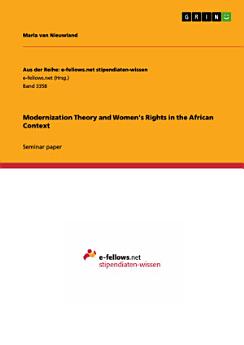Modernization Theory and Women's Rights in the African Context
Mar 2020 · GRIN Verlag
Ebook
22
Pages
family_home
Eligible
info
reportRatings and reviews aren’t verified Learn More
About this ebook
Seminar paper from the year 2019 in the subject Politics - Topic: International relations, grade: 1,3, Free University of Berlin (Otto Suhr Institut), course: Africa in International Politics, language: English, abstract: Women currently hold on average less than 1⁄4 of parliamentary seats worldwide. The range of female representation in national parliaments is staggering: countries are still in existence with zero female legislators, for instance Yemen, Papua New Guinea and Vanuatu, while on the other hand Rwanda with 61.3% of seats being held by women leads the way on female leadership. Scholars have estimated that, at current pace, it would take until the 22nd century for women to achieve political parity. Against this background of sustaining gender inequalities and seeing the extreme differences between countries, much research has been done on the topics of women’s rights and women’s leadership, in order to evaluate which approaches are most effective in creating actual gender equality. This paper will analyze one of these approaches towards women’s leadership, namely the link between modernization theory and women’s representation proposed by Pippa Norris and Ronald Inglehart. In their theory, Norris and Inglehart observe that women’s representation in post-industrial societies is much better than in post-communist or developing societies and they trace back this difference to the modernization process and the influence of cultural attitudes towards women’s empowerment. While Norris and Inglehart articulated their theory back in 2004, much has changed since then. Especially in sub-Saharan Africa women have joined national legislatures in remarkable numbers over the past two decades, raising the question, if the modernization process has actually lowered cultural barriers towards women’s empowerment, or if other factors were at work. To answer this research question, two African countries with very divergent cultural attitudes towards women’s rights, namely Tunisia and Botswana, are examined in the context of Norris’ and Inglehart’s theory in order to test, whether the hypotheses by Norris and Inglehart still hold up nowadays in the African context. This test will show, 1) if the theory is applicable to African countries at all and 2) if changes over the last two decades can be captured and explained by it.
Rate this ebook
Tell us what you think.
Reading information
Smartphones and tablets
Install the Google Play Books app for Android and iPad/iPhone. It syncs automatically with your account and allows you to read online or offline wherever you are.
Laptops and computers
You can listen to audiobooks purchased on Google Play using your computer's web browser.
eReaders and other devices
To read on e-ink devices like Kobo eReaders, you'll need to download a file and transfer it to your device. Follow the detailed Help Center instructions to transfer the files to supported eReaders.






